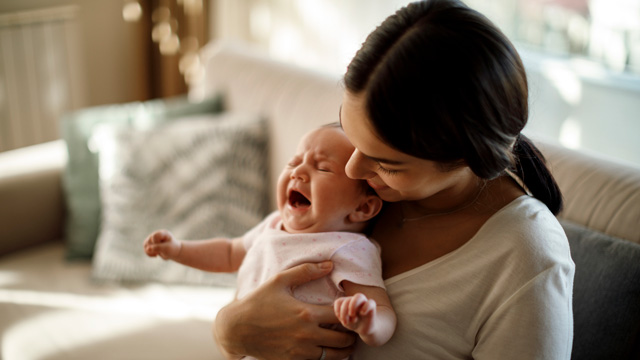The day is drawing to a close. Your beautiful, snuggly newborn baby starts to fuss, then starts to moan, then starts to cry, possibly even scream—woah, what’s this?! I’m afraid the witching hour has hit, my friend.
What is the witching hour for babies?
What is the witching hour, you may ask? It’s an intense period of fussiness or crying in the evenings, usually around 5 PM and lasting up to three hours. You’ll usually start seeing this when your baby hits 2 weeks of age, but the worst may pass by 12 weeks.
When the witching hour starts and when it ends
Witching hour typically occurs in the late afternoon or early evening. Usually around the 5 PM mark. Unfortunately, it doesn’t just last an hour, as the name suggests.
You may notice your newborn begin to have “fussy periods” where they’re hard to calm and console and your usual techniques of rocking or baby-wearing to calm may not help.
These regular fussy periods typically start when they reach 2 – 3 weeks of age. It hits its worst period at 6 weeks and tends to resolve in most cases by 12 weeks [1].
Why does the witching hour happen?
It’s challenging to nail down one particular culprit for your baby. Some things may either be responsible or at least may make the newborn witching hour worse like overtiredness, cluster feeding, stomach issues, or overstimulation.
Are they gassy?
Young babies are particularly vulnerable to gas and tummy issues. Their digestive systems are immature and if gas builds up it can cause discomfort and sometimes pain.
Is your baby overtired?
It’s pretty much impossible to fit very young babies into a by-the-clock schedule as they’re so unpredictable! Instead, we recommend working with wake windows at this age throughout the day. Typically, at 1 – 2 months of age, they will stay awake for 45 – 90 minutes at a time. It’s very usual for babies to catnap at this age, so if they’ve had long periods awake in the day, or just catnapped all day, then they may be overtired by 5 PM and super cranky!
How’s their day been?
How many visitors have you had? How many baby classes have you attended? For newborns everything is new. Sights, sounds, people, touch, and even their own hands! It’s easy for them to become overwhelmed and overstimulated. This stimulation requires energy, and as we all know (particularly parents of newborns) our ability to just keep going is limited.
Are they hungry?
It’s not uncommon for newborns to cluster feed in the evenings, topping up their tanks for the night. Even if you’ve only just fed them, they may be signaling to you that they’d like some more milk.
What are the differences between colic and witching hour for babies?
Colic is more defined. Babies with colic cry for more than 3 hours a day, for more than 3 days a week, and more than 3 weeks in a row. The baby’s witching hour will see periods of fussiness, on and off throughout the evenings. It may be intense and seem like it will never end.
Yes, they’re similar and both are incredibly stressful for parents. If you’re unsure or feel there may be more going on than general evening fussiness, please, discuss this with your pediatrician.
10 Tips on How to Manage the Witching Hour for Babies

Tip 1: Swaddle!
For many babies, swaddling can induce a womb-like environment which is reassuring and can bring a sense of calm. The swaddle can also bring a sense of security. Remember if they start to show signs of rolling then you need to transition out of the swaddle.
Tip 2: White noise.
Again, when the baby was in the womb they were used to a constant background hum. White noise also helps mask any background noises that may be too much.
Tip 3: Baby wear or hold.
Walk, sway – just cuddle them! No, you’re not setting up any bad habits, making a rod for your back, or anything else we regularly hear parents say. Your warmth and presence can be a huge comfort for your little one.
Tip 4: Try a change of environment.
Some babies will also calm down if taken outside for a walk in the fresh air. Which, if you’ve been subjected to intense, inconsolable crying for a while, will also be good for you too.
Tip 5: Quieten the environment.
Other babies may respond to quieting the environment, dimming the lights, and getting away from the background noises that can add pressure to an already overstimulated baby.
Tip 6: Prioritize those naps.
Some babies are more thrown than others when they go off schedule. If this is your baby and missing a nap leads to intense witching hour evenings then you may want to try hard to stick to a schedule. We’re all so different. Some babies are super portable and others need more structure and routine to their day.
Tip 7: Baby massage.
Try a gentle baby massage in a quiet, warm environment; they may respond to the touch, gentle movements, and calm. It also may help with growth spurt aches.
Tip 8: Try a pacifier.
For some babies, the rhythmic sucking can bring a sense of calm and peace.
Tip 9: Rule out gas pains.
Gas pains can cause intense discomfort and pain. Check out our blog advice for burping your baby.
Tip 10: Tick off the obvious stuff, too!
Double-check their diaper, temperature, and offer a feed. These are all reasons for excessive crying and easy to forget.
When to Talk to Your Pediatrician
If your kiddo’s crying seems to be linked to pain or sickness, check with your pediatrician. Keep track of other signs of sickness that may include:
Fever
Vomiting
Diarrhea (loose or bloody stools as well)
Not eating
Not alert as usual
Witching Hour for Babies FAQ
Q: How to get baby to sleep during the witching hour?
A: Unfortunately, there may not be an easy solution, but finding ways to reduce the fussiness can help. You may want to try a variety of things to see which works best for your baby. This can include swaddling, baby-wearing, massage, and other activities.
Q: Do all babies have a witching hour?
A: Some babies may have a witching hour, while others may not! It’s a period of fussiness or crying in the evenings. You’ll usually start seeing this when your baby hits 2 weeks of age, but the worst may pass by 12 weeks.
Q: Why do kids get cranky in the evening?
A: As the day draws to a close it’s common for babies and older children to feel the effects of too much fun! Overtired children can be incredibly cranky.
Q: What age does the witching hour start?
A: Typically, you’ll see the witching hour start around the age of 2 – 3 weeks.
Q: At what age does the witching hour end?
A: For most families, it peaks around 6 weeks and then lessens. By 12 weeks evenings should be calmer and that’s when babies outgrow the witching hour.
Q: Why do kids go crazy after dinner and before bed?
A: Overtired children can be cranky. However, overtired children can then also get a second wind, their hormones kick back in, and just keep them going. They may appear quite hyperactive.











